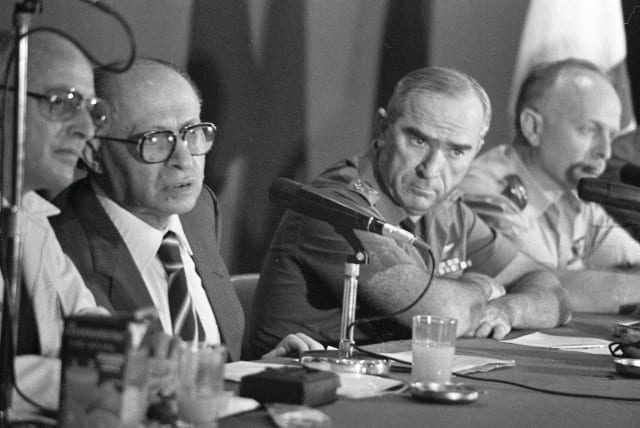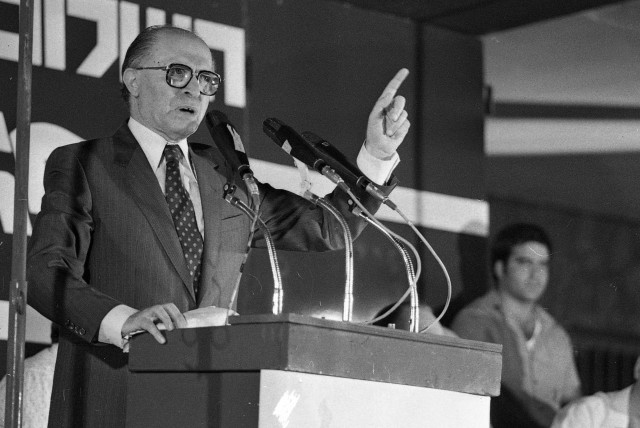Striking Osirak: The Begin Doctrine's enduring relevance in Israel - opinion

The “Begin Doctrine” dictates that Israel will not sit idly by and let an avowed enemy develop nuclear weapons.
On June 7, 1981, just hours before the onset of the Jewish festival of Shavuot, the Israel Air Force surprised the world by attacking and destroying the Osirak nuclear reactor outside of Baghdad.
The raid was not just an outstanding military achievement, but established an Israeli strategic precept. Named after Israel’s sixth prime minister Menachem Begin, the “Begin Doctrine” dictates that Israel will not sit idly by and let an avowed enemy develop nuclear weapons.
Code named Operation Opera, the strike on Osirak was launched on a Sunday – the day chosen in the belief that the French technicians employed in Iraq’s nuclear project would be at home over the weekend, decreasing the chances that they would be harmed in the attack.
Eight F-16 and six F-15 fighter jets took off from the IAF’s Etzion Airbase in Sinai (today Taba International Airport), flying across some 1,000 km. of hostile Jordanian, Saudi and Iraqi airspace before reaching their target.
King Hussein of Jordan, reportedly on vacation in Aqaba, noticed the Israeli aircraft heading east. Suspecting they were on their way to Iraq, he ordered Baghdad be warned. But the king’s message failed to reach the Iraqis.
The strike against the reactor lasted under two minutes, with the IAF successfully accomplishing its mission without losing personnel or aircraft.
How did Israel view the attack on Iraq's nuclear reactor?
In Israel, the raid was viewed as an unmitigated triumph, undoubtedly contributing to Begin’s reelection three weeks later. But Begin always denied that the attack was designed to help his Likud party achieve victory, proclaiming he would never have sent Israeli pilots into harm’s way for partisan advantage (and of course, had the operation gone wrong, it could have cost him politically).
However, Begin did admit that the election was a consideration in determining the timing of the attack. He worried that plans for Operation Opera would be shelved if Labor’s Shimon Peres would win the ballot and become prime minister, and therefore chose to schedule the raid prior to polling day.
If Israelis celebrated the destruction of Iraq’s nuclear reactor, the rest of the world refused to join in. On the contrary, Jerusalem was castigated for its action.
The world condemned Israel for attacking the nuclear reactor near Baghdad
On June 19, the UN Security Council unanimously condemned the attack, calling it a “clear violation of the Charter of the United Nations and the norms of international conduct.”
The US not only voted for the resolution, but to emphasize its displeasure, announced it was suspending the delivery of additional F-16s to the IAF.
At the time, the Reagan administration was trying to improve ties with Baghdad. It was therefore critical for the US to distance itself from Israel’s raid, stressing that no advanced notification had been received and denouncing the strike as “a source of utmost concern.’’
Washington’s adverse reaction was foreseen in Jerusalem and was a consideration for those in Israel’s security cabinet who argued against launching the attack.
Opposition in Israel from the attack on Iraq
That opposition came from influential quarters, including Yigal Yadin, the deputy prime minister and former IDF chief of staff. Leading elements within the national security structure – among them the heads of the Mossad and Military Intelligence – were also averse to the strike, as were the two previous ministers of defense, former IAF commander Ezer Weizman, and Peres.
In addition to the expected global censure, the dissenters had misgivings about the mission’s chances of success, the grave risks facing IAF aircrew flying deep into enemy territory, the possibility that the raid could endanger the newly-forged Egypt-Israel peace, and the threat that the strike would trigger an escalation into a wider Middle East war.
All these concerns were augmented by the assumption that even if the reactor was successfully destroyed, Operation Opera could not prevent the Iraqis from reconstituting their nuclear program by building a new reactor, better protected against a future air strike.
Those objecting highlighted the very real uncertainties and vulnerabilities involved, while asserting that any potential benefit to be incurred would be short-lived. Why, they asked, should Israel embark upon such a risky operation if, in any case, it would only be a matter of time before Baghdad would be back on its path to the bomb?
Why did Menachem Begin insist Israel should attack Iraq?
BEGIN, NONETHELESS, remained unwavering, convinced the attack was both a moral imperative and a strategic necessity. Like many European-born Jews of his generation, the prime minister was haunted by the Holocaust, and saw his singular obligation as a national leader to safeguard the Jewish people from those seeking its annihilation.
For Begin, Iraq’s megalomaniacal and barbarous dictator, Saddam Hussein, had to be taken seriously when he publicly advocated the destruction of the Jewish state. It was thus incumbent to prevent Baghdad’s strongman from attaining weapons of mass destruction that could make his genocidal designs realizable.
Those inside the government disputing the benefits of the raid were not wrong in predicting that Iraq would try to reestablish its nuclear program. But the Osirak strike did buy time, so much so that in January 1991, when the first Gulf War erupted in the aftermath of Hussein’s invasion of Kuwait (Operation Desert Storm), Baghdad had still not built an atomic warhead. The subsequently established international inspection regime in Iraq prevented him from ever doing so.
Then as now, there are those at the highest echelons of Israel’s national security structure who express reservations about striking against an enemy’s nuclear facilities. Then as now, they point to the enormous dangers involved in any such operation. Then as now, they doubt the ability to eliminate a threatening nuclear program once and for all.
But Begin demonstrated that even temporarily halting a foe’s march toward the bomb can create a window for other developments to occur. And if non-kinetic tools are proving ineffective in preventing proliferation, what is the alternative? To await the inevitable?
Postscript 1: A decade after the Osirak strike, Washington shifted from condemnation to acclamation. Following the first Gulf War, US defense secretary Dick Cheney sent general David Ivry, IAF commander during Operation Opera, a satellite photograph of the bombed-out reactor taken days after Israel’s raid. It was inscribed: “With thanks and appreciation. You made our job easier in Desert Storm.”
Postscript 2: In September 2007, reasserting the primacy of the “Begin Doctrine,” prime minister Ehud Olmert ordered the IAF to destroy the nuclear reactor that Syria was secretly building in Deir ez-Zor. Like Hussein, Syrian dictator Bashar Assad would use chemical weapons to murder his own people, but Israel denied him a parallel nonconventional capability.
The writer, formerly an adviser to the prime minister, is chair of the Abba Eban Institute for Diplomacy at Reichman University. Connect with him on LinkedIn, @Ambassador Mark Regev.
Jerusalem Post Store
`; document.getElementById("linkPremium").innerHTML = cont; var divWithLink = document.getElementById("premium-link"); if (divWithLink !== null && divWithLink !== 'undefined') { divWithLink.style.border = "solid 1px #cb0f3e"; divWithLink.style.textAlign = "center"; divWithLink.style.marginBottom = "15px"; divWithLink.style.marginTop = "15px"; divWithLink.style.width = "100%"; divWithLink.style.backgroundColor = "#122952"; divWithLink.style.color = "#ffffff"; divWithLink.style.lineHeight = "1.5"; } } (function (v, i) { });

